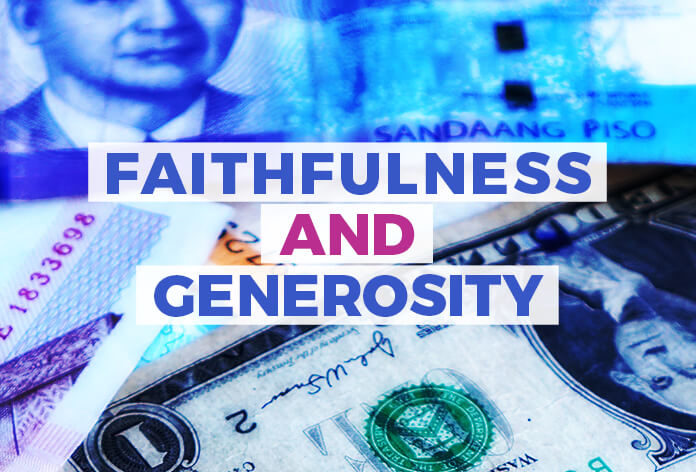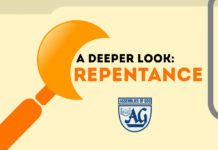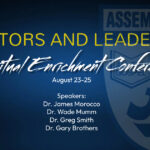Last summer, I was invited to speak on a very specific topic “My heart, My Pocket”. At first glance, they looked two very different components – but actually they’re very related. No wonder Jesus sternly said, ‘you cannot love God and money’. Jesus taught more on generosity rather than the Old Testament tithing. It does not mean that tithing is not a NT concept – rather the subject of tithing is more enhanced in the concept of generosity.
During one of the seminars I did, a brother raised his complaint why he is still very financially tight. So, I asked: “How has been your giving like?”. He said, “I have been so faithful with my tithes and I have receipts to prove it.” So, I responded, “if you are faithful with your tithes, it does not mean that you have given. Those are two different things. The spiritual discipline on tithing is faithfulness while the spiritual discipline on giving is generosity. If you have only brought your tithes to the house of God and that’s all – you have not given yet.” To my surprise, a lot of church leaders who heard me say that were surprised. Matthew 6:21 clearly reminds us that money does not follow heart. It’s the heart that follows money.
Ours is being an OBEDIENT GIVER. This is what the New Testament is dealing with. Generosity is done in the context of discipleship. Unfortunately, in the past, the economic component in the church was often reduced to discussions about budgets and fundraising and pledge campaigns, and we considered the notion of money to be a dirty subject. But something has changed. We need to realize that if I am a true follower of Jesus Christ, if I am a part of this church community, if I say these are my people and I intend to live my Christian life in conjunction with them, we begin to look at money differently. We see it as part of our worship. We see it as part of our commitment. We see it as part of the exercise of our Christian growth. The economic component is not just business; it’s discipleship. It’s a way of measuring the closeness I have in my walk with Jesus Christ.
I read some books on anthropology (just out of curiosity) and I learned that when they study a particular people group, anthropologists will always look into the economic component of that particular group. They will ask basic important questions: What do these people consider to be wealth? How is that wealth created? What do they do with that wealth and how do they share it beyond themselves? In other words, is there any concept of giving in this culture or is it all taking and holding? And finally, when this wealth is exchanged, what are the results?” It is obvious that every human relationship is not a relationship until its economic component is identified.
True indeed – the New Testament church that is introduced to us in Acts 2:42ff, was not only branded as a learning church, a worshipping church and evangelistic church. Part of those distinctive is how the new church cared for each other. Verse 44 says, “All the believers were together and they had all things in common [koina]. Selling their possessions and goods they gave to anyone as he had need.” What does it mean? This is meant to bear witness to the rest of us, “that a human life does not consist in the abundance of our possessions.” There are more important things in life than what we own. This was Jesus’ core challenge to the so-called rich young ruler in Luke 10.
We talked about the New Testament church in Acts 2 – actually after Jesus ascended into heaven and the apostles finally died off – the Christian movement flourished (other than the move of the Holy Spirit in their midst) not mainly of its preaching but the whole Christian movement was known for its generosity. It was what the 21st Century calls “BRANDING’. Just as McDonalds has the golden arches, Nike has the swish, just as Apple has the apple with the bite taken out of it, so the brand of Christians for the first three centuries was they were always on the give.
In Luke 16:19ff – Jesus told the story of a rich man who lived in a spacious home and ate the best gourmet foods every day while just a few feet away from him, just outside the front door, was a beggar who spent every day in the dust and the dirt filled with sores. Jesus draws this graphic picture contrasting the man who has everything but will be generous with none of it, except a few scraps from his table, and this beggar. This story is very disturbing to any of us who take it seriously, because you know where the rich man ends up. Then in chapter 21, is another tiny story that is stretched to its furthest extremes to make an important point. “But then a poor widow came and put in two very small copper coins worth only a fraction of a penny. Calling his disciples to him, Jesus said, ‘I tell you the truth. This poor widow has put more into the treasury than all the others. They all gave out of their wealth, but she out of her poverty put in everything, all she had to live on.’”
Jesus contrasted her with those people making all this noise about their giving – dubbed obligatory givers. They gave their money according to the strict standard of what the law says they had to give. None of them really want to give, and they’re finding all kinds of loopholes to give less, if possible. They’re trying to deal with the minimums.
When Jesus said, “She gave everything she had,” he was electrified about this thing because he had come to give everything he had. There is a strong sense in which Jesus Christ and this widow are the same. They share in common this notion of generosity. They gave everything they had.
On the final note, I want to leave a couple of thoughts to all of us to ponder on. First, that generous giving is done voluntarily. No one has to persuade us to do it. As the Bible puts it, “not out of compulsion”. We give because we want to make a contribution to something that needed to be changed. The second thought is – our generosity should always be sacrificial. With this I mean we are not just giving out of our wealth so that nothing changes in our lives, but changing our lifestyle so that we can do more things with our money than would have been done ordinarily. Generous giving is about being redemptive. We want to use part of what God has given to us to change the lives of other people.
If you are a Pastor, or Bible Study or Cell Group leader, preach or teach about generosity regularly, manage God’s resources properly (work on a budget) and evaluate your financial systems appropriately.














